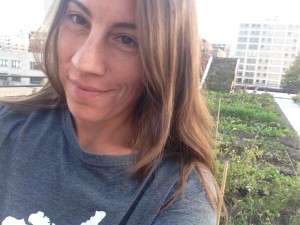
Disrupting Urban Agriculture with Mary Ostafi
Disrupting Urban Agriculture with Mary Ostafi. An award-winning architect, a sustainability consultant & she's taught & worked as an organic farm apprentice.
 Mary Ostafi has been an award-winning architect, a sustainability consultant and she’s taught and worked as an organic farm apprentice. Today she heads up Urban Harvest STL, where they work on rooftop farms, sustainability, urban living and quality of life for all.
Mary Ostafi has been an award-winning architect, a sustainability consultant and she’s taught and worked as an organic farm apprentice. Today she heads up Urban Harvest STL, where they work on rooftop farms, sustainability, urban living and quality of life for all.
Why a rooftop farm? Why not just grow somewhere where it’s easier?
This is the opportunity to farm where I live in the urban core, where there’s no vacant lots, yet an abundance of unused rooftops. The roof also has advantages beyond its food—it helps reduce the energy needs of a building, reduces heat island effect, helps with stormwater management, enhances biodiversity, provides community gathering space and it’s an education setting.
What could be better about our existing food system?
We could start by using less pesticides and chemicals on the food we eat. Fewer monocrops, too, we need to grow to enhance ecosystems. We need to build resilience in the way we farm as well.
What’s the role of urban agriculture in the bigger picture?
To provide food where people live, and provide a more resilient local food system. With climate change, centralization of food supplies and other pressures, we need to be smarter about providing food in cities where 50% of the population lives.
Tell us about the selfie you sent us to use with this story—where did you take it, what’s in the shot, what’s interesting to you about it?
Just enjoying another beautiful day at my office—the FOOD ROOF Farm.
Where do you get inspiration?
Everywhere. Through travel. I’m inspired by nature and by people. When I think about how resilient nature is, I want to do the same for agriculture.
Explain what resiliency means to you.
Being nimble, prepared, able to adapt to change. Taking a systems perspective, recognizing the interconnectedness of everything, looking at how timeless those have become, and translating that to our built systems.
Beyond education/training, what prepared you for what you’re doing now?
I don’t know that I was necessarily prepared for any of this (laughs). I don’t over prepare, I just do. Is anybody really prepared? I think it’s more about taking a risk and believing in yourself. I still take risks every day.
What do you struggle with the most?
Time. Work/life balance for sure. In a way, this is my life. My husband is my partner in crime, he’s Urban Harvest STL’s co-founder, I couldn’t do it without his support.
Who’s a person in your past that helped you become who you are? What did they do? Do they know their influence on you?
A very close friend, Caroline Nolan, who I went to graduate school with in Sweden. She really helps me, even to today, and as a communications guru she understand the value of networks. When I met her, she was the editor of Green Roofs for Healthy Cities magazine, and now she’s a consultant. Our thesis dissertation was a sustainability plan for the city of Dublin, Ireland.
When have you failed and what did you learn?
I failed at building this project, to be honest, at one time, and gave up. I couldn’t get a lease, didn’t have the money. I learned from my husband, Caroline Nolan, and others how to stay true to my vision. With intention, anything is possible.
When you’re gone, what do you hope your contribution will have been?
That I would have inspired a few people to grow their own food.
Who is a favorite artist, author or musician?
I don’t have favorites but Salvador Dali comes to mind in this moment. I fell in love with his work when I was studying in Spain. I found his work strange, fascinating, unexpected—and in that way I find it very inspirational.
When do you live by routines? What are those routines?
I like to wake up to the sun and first thing, meditate, to start the day. I like to end the day reading a book to clear my mind.
What productivity tools can you not live without?
I’ve got some really good gardening apps like Bugs in the Garden that help me identify the various insects I encounter. Those and the NextMetroSTL app. Also my bike—people don’t recognize me when I don’t have my bike, it’s my preferred mode of transportation.
Who else’s work do you admire and why?
Honeybees. I recently became a beekeeper. I really admire the queen bee and her ability to manage her 20,000 daughters. It’s just really interesting how a society of bees work together selflessly. It just goes to show what you can accomplish when you collaborate in a structured way.
How can people follow you (twitter, blog, events, etc.)?
We’re on all the networks – Twitter, Facebook, Instagram, or they can go to our site.
